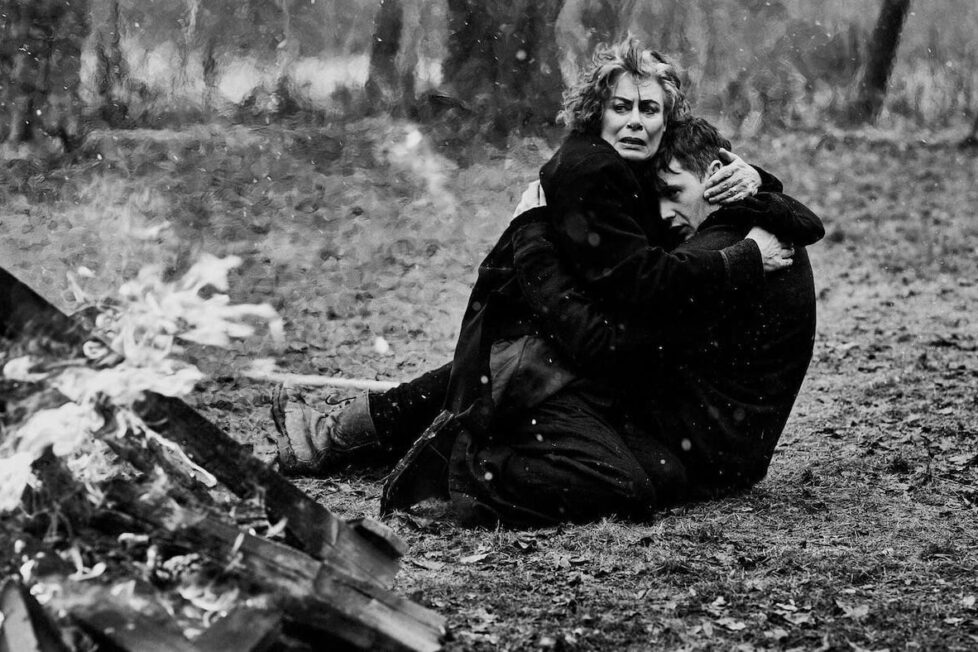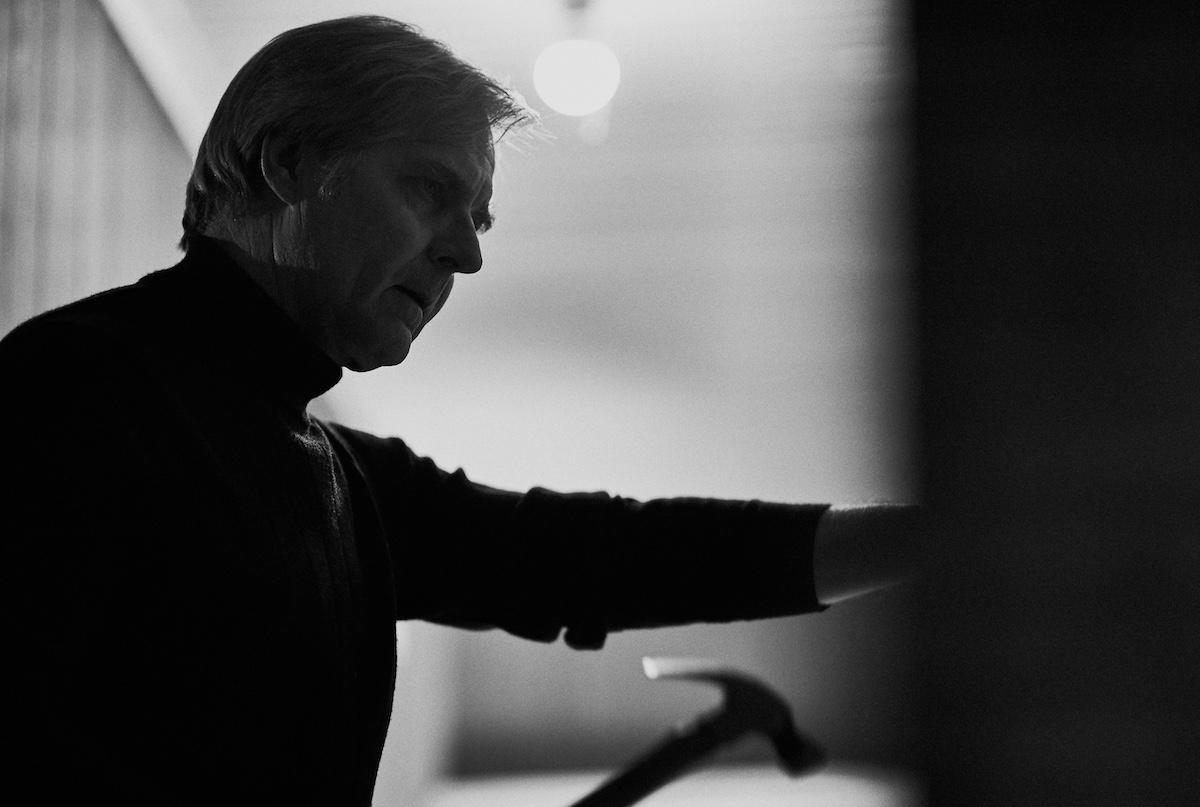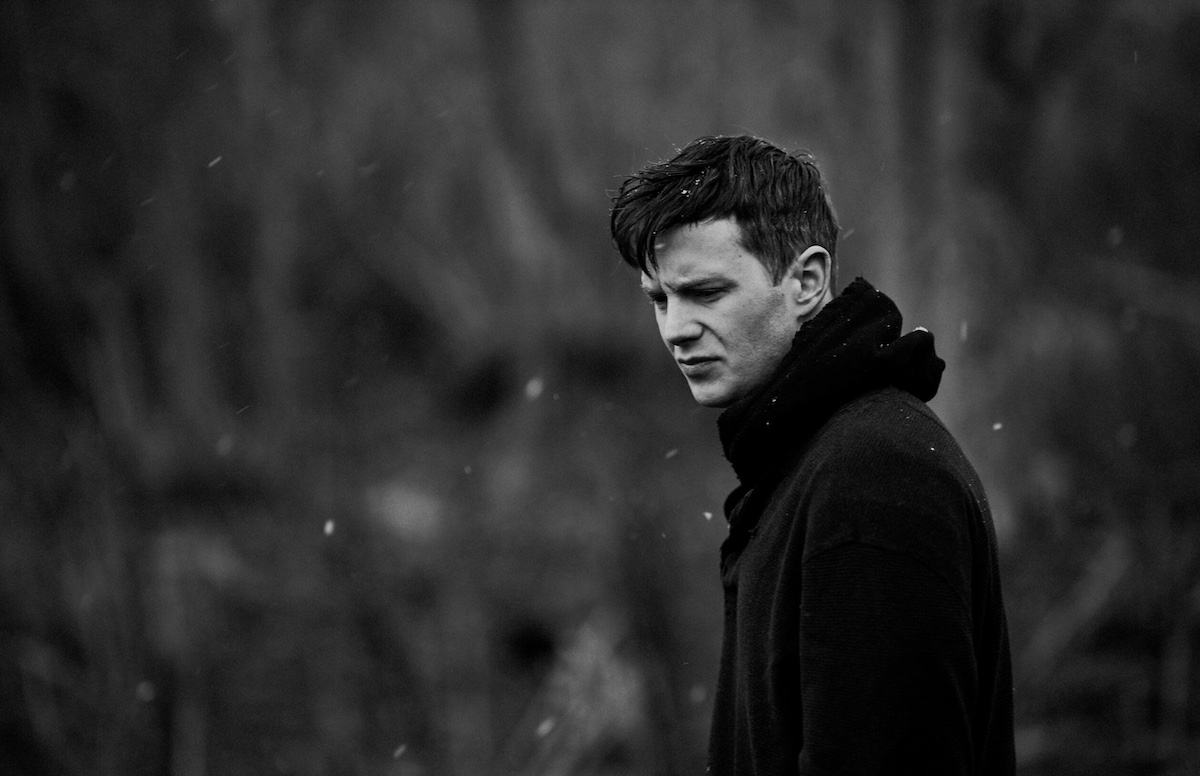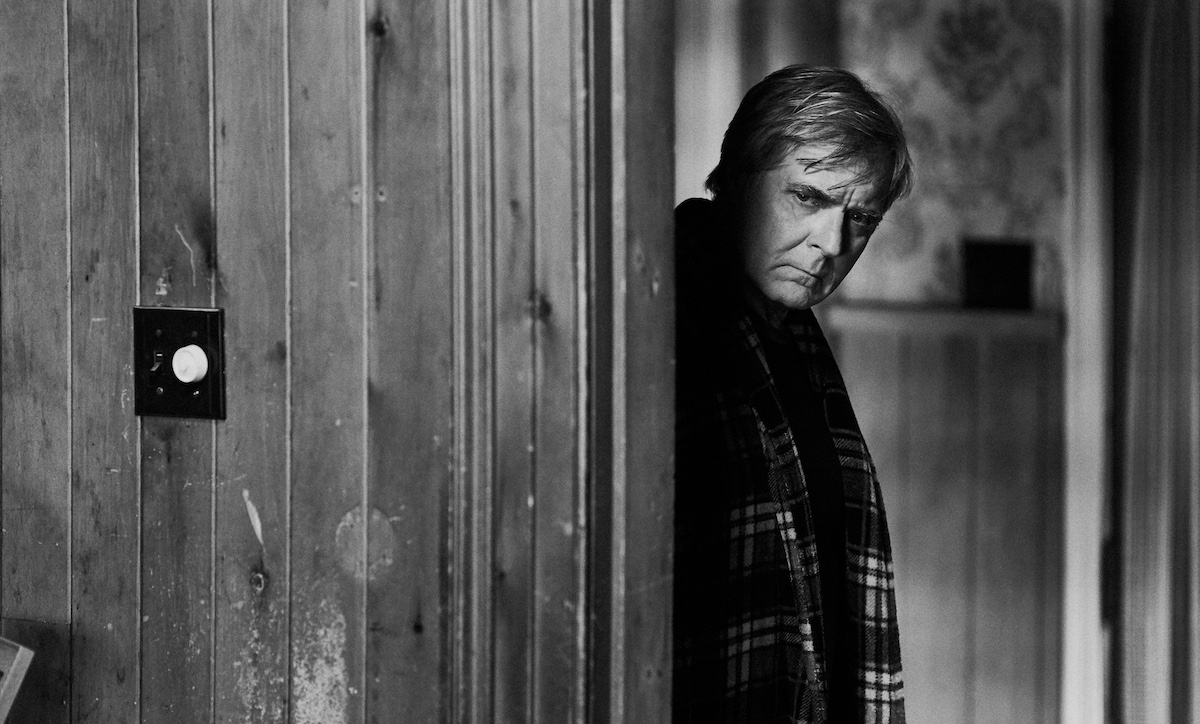THE RIGHTEOUS (2021)
A burdened man feels the wrath of a vengeful God after he and his wife are visited by a mysterious stranger.

A burdened man feels the wrath of a vengeful God after he and his wife are visited by a mysterious stranger.


Canadian actor Mark O’Brien not only writes and directs The Righteous, his feature debut behind the camera, but also takes one of the two most important roles, and judging from the interviews on this Arrow Video Blu-ray’s extras he had a precise vision before even a single frame was shot.
It can fairly be considered an auteur work, then—and one of considerable talent—but he has excellent support from the remainder of the small cast, as well as cinematographer Scott McClellan and noted young Canadian composer Andrew Staniland. This is primarily a movie of ideas but it’s a stylishly executed one too.
The Righteous is a dark film in every way; its black-and-white interiors are mostly gloomy, outdoor scenes never admit much sunshine, and themes of sin, guilt and punishment weigh heavy on every moment. There’s horror here, but genre fans may be disappointed to find it’s virtually all of a bleak, existential, Bergmanesque variety. Some will find it heavy going as a result, but it certainly isn’t slow or meandering; the focus on its central questions is intense, every scene is to the point, and there is no let-up. And if some passages are necessarily slightly stagey because of the emphasis on dialogue over action, that never feels like a burden.

Nominally set in Newfoundland, although neither the place nor the time is clear or important (O’Brien, a Newfoundlander, says he specifically wanted to avoid making a movie about the province), The Righteous establishes its tone from the first shot of Frederic (Henry Czerny) praying. His relationship to God, a troubled or even failed one, is fundamental to the film; Frederic is a former Roman Catholic priest who left the clergy to marry Ethel (Mimi Kuzyk), but he seems worried by other, as yet unspecified sins, and by the idea that God might be vengeful rather than forgiving.
He and Ethel also have recent tragedy to deal with, as we see them together, resembling the farmers in American Gothic, at the funeral of their young adoptive daughter Joanie. Frederic fears her death might be a punishment from God, and wonders if there’s more to come. He might not be entirely stable, as he has visions of Joanie, he nails planks over the door to her untouched bedroom, and he starts dismantling her play equipment in the yard….
Into this tense and unhappy environment, a young man called Aaron (O’Brien) appears outside Frederic and Ethel’s house one night with a sprained foot, asking for help. He gives them a vague and unlikely explanation, and when asked where he’s from he simply says “everywhere”. Ethel is mistrustful but Frederic seems to feel a responsibility toward Aaron, and even claims to another visitor that he’s a relative.
Before long Aaron’s embedded himself in the middle-aged couple’s lives. Ethel warms to him and offers him Joanie’s room, while his relationship with Frederic grows both more intimate and more hostile, and soon he’s asking the older man to do something that goes against all Frederic’s convictions. (I can’t say more without giving away one of the story’s three big surprises, but it’s worth noting—in case my loose outline leaves the wrong impression—that this is not sexual. Aaron is encouraging Frederic into a far greater offence, and Frederic’s dilemma is whether he can make amends for a past sin by committing another, graver one.)

Who is Aaron? Though it becomes increasingly clear that he embodies Frederic’s guilt about the past, he’s not entirely a figment of Frederic’s imagination—other people meet him too. But is he just a young man with an unexpected, initially unrevealed connection to Frederic and Ethel? Did he really move across the room with preternatural speed? Why does he question whether God (“this man you never even met”) can be trusted? Are the echoes of The Exorcist (1973) in his outburst of obscenity telling us something? For that matter, when Frederic kneels to pray, why does the shape of a decoration on the wall seem to give him horns?
It’s possible that much of what happens is in Frederic’s mind (and the final scene, with its contrast between one character living in a world of religious transcendence while the others inhabit a more mundanely sad one, recalls 2020’s Saint Maud). Another priest (Nigel Bennett) warns Frederic to be aware of “the difference between what’s real and what our conscience has created to punish us”. But it is also possible that all—or at least most—of it actually does happen, and even that Frederic’s guilt has brought about genuinely supernatural events.
In a film primarily made of words, the cast is consistently excellent. Czerny leaves us wondering whether Frederic is genuinely remorseful or just apprehensive, whether he is genuinely pious or just trying to convince himself that he is. O’Brien has the more forceful role as Aaron and plays it in a menacingly relaxed way; from his first appearance, we have the impression that he’s too open and friendly to be true.
Kuzyk makes for a haunting Ethel; watchful-eyed, nervous of everything (including, perhaps, her husband) and then girlishly delighted to take care of Aaron. It’s not overtly explored, but he might be filling the gap left by her lost daughter. In a smaller part, Kate Corbett is also memorable as Joanie’s real mother Doris, giggly but sad beneath (“I get a little too eager”).

McClellan’s monochrome photography is crisp, with pronounced shadows and exterior shots of Frederic and Ethel’s home adding to the atmosphere of foreboding, while Staniland’s score is understated, coming to the fore only in key scenes, varied and devoid of cliché. (We can excuse the use of choral music here given the film’s religious concerns.)
The Righteous doesn’t offer up complete answers to the issues it raises: can Frederic ever really atone for his past wrongdoing? Can the punishment, in the form of guilt or something more extreme, be worse than the crime? Does the good in a life cancel out the bad? Do we sometimes deserve to hate ourselves? Is sin an objectively real thing, or does it only exist in our minds?
If there’s a single takeaway from O’Brien’s film, it’s probably about the power of guilt and its ability to dominate us. It has broken Frederic, not made him a better man, and when it appears in the physical form of Aaron its influence is completely destructive—not just toward Frederic himself but toward others as well. On that level, though this can’t be described as an anti-religious movie, it’s one that questions the impact of religion on individuals.
But it’s open to other interpretations and will doubtless feed back to many viewers a new angle on whatever ideas they bring to it. Anything but dogmatic and judgmental, The Righteous is a film whose small scale never constricts its remarkable depth and richness… a terrifically impressive debut from O’Brien.
CANADA | 2021 | 97 MINUTES | BLACK & WHITE | ENGLISH


writer & director: Mark O’Brien.
starring: Henry Czerny, Mimi Kuzyk & Mark O’Brien.
